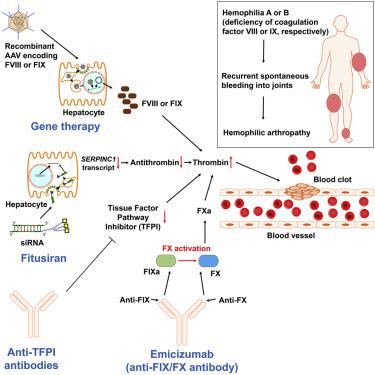当前位置:
X-MOL 学术
›
Mol. Ther.
›
论文详情
Our official English website, www.x-mol.net, welcomes your
feedback! (Note: you will need to create a separate account there.)
A Molecular Revolution in the Treatment of Hemophilia.
Molecular Therapy ( IF 12.1 ) Pub Date : 2019-11-13 , DOI: 10.1016/j.ymthe.2019.11.006 John S S Butterfield 1 , Kerry M Hege 2 , Roland W Herzog 3 , Radoslaw Kaczmarek 4
Molecular Therapy ( IF 12.1 ) Pub Date : 2019-11-13 , DOI: 10.1016/j.ymthe.2019.11.006 John S S Butterfield 1 , Kerry M Hege 2 , Roland W Herzog 3 , Radoslaw Kaczmarek 4
Affiliation

|
For decades, the monogenetic bleeding disorders hemophilia A and B (coagulation factor VIII and IX deficiency) have been treated with systemic protein replacement therapy. Now, diverse molecular medicines, ranging from antibody to gene to RNA therapy, are transforming treatment. Traditional replacement therapy requires twice to thrice weekly intravenous infusions of factor. While extended half-life products may reduce the frequency of injections, patients continue to face a lifelong burden of the therapy, suboptimal protection from bleeding and joint damage, and potential development of neutralizing anti-drug antibodies (inhibitors) that require less efficacious bypassing agents and further reduce quality of life. Novel non-replacement and gene therapies aim to address these remaining issues. A recently approved factor VIII-mimetic antibody accomplishes hemostatic correction in patients both with and without inhibitors. Antibodies against tissue factor pathway inhibitor (TFPI) and antithrombin-specific small interfering RNA (siRNA) target natural anticoagulant pathways to rebalance hemostasis. Adeno-associated virus (AAV) gene therapy provides lasting clotting factor replacement and can also be used to induce immune tolerance. Multiple gene-editing techniques are under clinical or preclinical investigation. Here, we provide a comprehensive overview of these approaches, explain how they differ from standard therapies, and predict how the hemophilia treatment landscape will be reshaped.
中文翻译:

治疗血友病的分子革命。
数十年来,单基因出血性疾病血友病A和B(凝血因子VIII和IX缺乏)已通过全身性蛋白质替代疗法治疗。现在,从抗体到基因再到RNA治疗的各种分子药物正在改变治疗方法。传统的替代疗法需要每周两次静脉输注三次因子。虽然延长半衰期的产品可能会减少注射频率,但患者仍将面临终生的治疗负担,对出血和关节损伤的最佳保护,以及潜在的中和性抗药抗体(抑制剂)的发展,这些中和性抗药物抗体(抑制剂)需要较少的有效旁路剂并进一步降低生活质量。新颖的非替代和基因疗法旨在解决这些遗留问题。最近批准的凝血因子VIII模拟抗体可在有或没有抑制剂的患者中完成止血校正。针对组织因子途径抑制剂(TFPI)的抗体和抗凝血酶特异性小干扰RNA(siRNA)靶向天然抗凝途径,以重新平衡止血作用。腺相关病毒(AAV)基因疗法可提供持久的凝血因子替代,也可用于诱导免疫耐受。多种基因编辑技术正在临床或临床前研究中。在这里,我们提供了这些方法的全面概述,解释了它们与标准疗法的不同之处,并预测了血友病治疗领域将如何重塑。针对组织因子途径抑制剂(TFPI)的抗体和抗凝血酶特异性小干扰RNA(siRNA)靶向天然抗凝途径,以重新平衡止血作用。腺相关病毒(AAV)基因疗法可提供持久的凝血因子替代,也可用于诱导免疫耐受。多种基因编辑技术正在临床或临床前研究中。在这里,我们提供了这些方法的全面概述,解释了它们与标准疗法的不同之处,并预测了血友病治疗领域将如何重塑。针对组织因子途径抑制剂(TFPI)的抗体和抗凝血酶特异性小干扰RNA(siRNA)靶向天然抗凝途径,以重新平衡止血作用。腺相关病毒(AAV)基因疗法可提供持久的凝血因子替代,也可用于诱导免疫耐受。多种基因编辑技术正在临床或临床前研究中。在这里,我们提供了这些方法的全面概述,解释了它们与标准疗法的不同之处,并预测了血友病治疗领域将如何重塑。多种基因编辑技术正在临床或临床前研究中。在这里,我们提供了这些方法的全面概述,解释了它们与标准疗法的不同之处,并预测了如何重塑血友病的治疗方式。多种基因编辑技术正在临床或临床前研究中。在这里,我们提供了这些方法的全面概述,解释了它们与标准疗法的不同之处,并预测了如何重塑血友病的治疗方式。
更新日期:2019-11-13
中文翻译:

治疗血友病的分子革命。
数十年来,单基因出血性疾病血友病A和B(凝血因子VIII和IX缺乏)已通过全身性蛋白质替代疗法治疗。现在,从抗体到基因再到RNA治疗的各种分子药物正在改变治疗方法。传统的替代疗法需要每周两次静脉输注三次因子。虽然延长半衰期的产品可能会减少注射频率,但患者仍将面临终生的治疗负担,对出血和关节损伤的最佳保护,以及潜在的中和性抗药抗体(抑制剂)的发展,这些中和性抗药物抗体(抑制剂)需要较少的有效旁路剂并进一步降低生活质量。新颖的非替代和基因疗法旨在解决这些遗留问题。最近批准的凝血因子VIII模拟抗体可在有或没有抑制剂的患者中完成止血校正。针对组织因子途径抑制剂(TFPI)的抗体和抗凝血酶特异性小干扰RNA(siRNA)靶向天然抗凝途径,以重新平衡止血作用。腺相关病毒(AAV)基因疗法可提供持久的凝血因子替代,也可用于诱导免疫耐受。多种基因编辑技术正在临床或临床前研究中。在这里,我们提供了这些方法的全面概述,解释了它们与标准疗法的不同之处,并预测了血友病治疗领域将如何重塑。针对组织因子途径抑制剂(TFPI)的抗体和抗凝血酶特异性小干扰RNA(siRNA)靶向天然抗凝途径,以重新平衡止血作用。腺相关病毒(AAV)基因疗法可提供持久的凝血因子替代,也可用于诱导免疫耐受。多种基因编辑技术正在临床或临床前研究中。在这里,我们提供了这些方法的全面概述,解释了它们与标准疗法的不同之处,并预测了血友病治疗领域将如何重塑。针对组织因子途径抑制剂(TFPI)的抗体和抗凝血酶特异性小干扰RNA(siRNA)靶向天然抗凝途径,以重新平衡止血作用。腺相关病毒(AAV)基因疗法可提供持久的凝血因子替代,也可用于诱导免疫耐受。多种基因编辑技术正在临床或临床前研究中。在这里,我们提供了这些方法的全面概述,解释了它们与标准疗法的不同之处,并预测了血友病治疗领域将如何重塑。多种基因编辑技术正在临床或临床前研究中。在这里,我们提供了这些方法的全面概述,解释了它们与标准疗法的不同之处,并预测了如何重塑血友病的治疗方式。多种基因编辑技术正在临床或临床前研究中。在这里,我们提供了这些方法的全面概述,解释了它们与标准疗法的不同之处,并预测了如何重塑血友病的治疗方式。











































 京公网安备 11010802027423号
京公网安备 11010802027423号